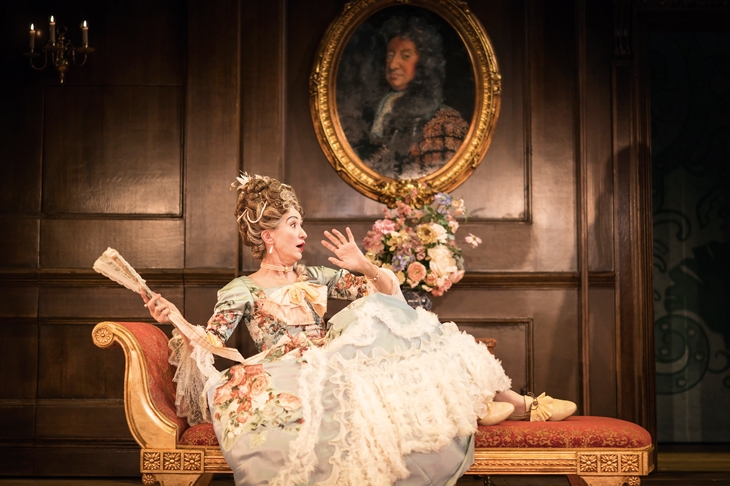Quiz by James Graham looks at the failed attempt in 2001 to swindle a million quid from an ITV game show. Jackpot winner Major Charles Ingram was thought to have been helped by strategic coughs emanating from Tecwen Whittock, a fellow contestant on Who Wants to Be a Millionaire? Graham, best known for his gripping political dramas, can’t muster any passion for this story or his characters. Ingram is a posh, weepy lummox. His wife, Diana, comes across as a blur of aloofness, cunning and banality. Whittock, who claimed to suffer from a persistent throat condition, is a clueless hobbit with a wonky Welsh accent. And Diana’s brother, tangentially involvedin the drama, is an amiably bumbling spendthrift.
The material has a built-in problem. Whose side are we on? The story is about some fairly rich people trying to rip off some very rich people, so are we rooting for the greedy but twerpish Ingrams or for the cocky, obsessive and mega-wealthy Paul Smith, owner of the Millionaire format? Graham addresses this problem by directing our attention elsewhere and he bungs a bit of everything into the script. We explore the Ingrams’s early marriage. We get a brief history of British TV quizzes. We examine the difficulties faced by Smith and other format-mongers as they seek broadcasters for their shows. And we enter the twilight world of quizzers and scammers who meet in dank pubs and swap notes about how best to swindle TV game shows. Even these diversions aren’t enough to pad out the evening to the full three hours so the actors enlist the audience in parlour games and questionnaires.
There are a couple of decent performances here. Sarah Woodward is impressive as an icy QC and she adds an amusing cameo as a Coronation Street star. Keir Charles delivers a hilarious impersonation of Chris Tarrant, the show’s curmudgeonly host, who guessed that something was amiss but couldn’t work out what. Graham’s script never quite coheres, even at the climax of the trial. The jury convicts Charles and Tecwen but fails to reach a decision on Diana. The judge intervenes and rules that this split decision invalidates the prosecution’s case that all three defendants took part in a single conspiracy. So the foreman changes his mind, without consulting the jury, and finds Diana guilty.
Did that happen? (I checked later and discovered that this shorthand version is accurate in its essential details.) But to leave this off-kilter judgment in the script without any clarification is to create more confusion. I left the show in a state of bafflement. I wasn’t sure whether the Ingrams had done anything wrong and I wasn’t sure why I felt so unsure. Director Daniel Evans deserves top marks for turning a colourless script into a handsome, zingy, fast-moving theatrical spectacle. It’s fun but unfulfilling.
Has anyone noticed that Congreve’s rarely performed classic, The Way of the World, defies intelligibility? The densely plotted play opens in a London coffee shop where two self-satisfied wags exchange gossip about their cronies, relatives, ex-playmates and future lovers. Their list of contacts is exhaustingly long, and the characters have obtusely silly names (Foible, Fainall, Waitwell, Wishfort, Witwoud). Worse still, some of these personalities fail to materialise for an hour or more, and the audience is expected to remain alert to their attributes without seeing them in the flesh. It’s hell to follow.
The script’s greatest virtue is its dazzling literary elegance and the director, James Macdonald, has created a luxuriously effective production. The acting is fine. The spare, unfussy set offers a suitably muted back-drop for Congreve’s literary fireworks. The ladies’ dresses are perhaps a bit wedding-cake and the men’s costumes feature several ingenious and deliberate anachronisms that work very well. But what a ghastly crew of characters. The men are poseurs, cynics, embezzlers or fools, and the women are hysterics, adulteresses, nymphomaniacs or fools.
Congreve’s wit too often expresses mere nastiness. ‘Anger aids complexion, saves paint,’ says a wag, appearing to mean, ‘I like women when they’re upset.’ ‘She is the antidote to desire,’ observes a dissembling suitor of an ageing sexpot. This famous jibe — perhaps the cruellest in our tongue — is aimed at Lady Wishfort, gallantly played by Haydn Gwynne. Her ladyship is a rich drunken matriarch tyrannised by three contradictory forces: her rampaging libido, her fear of public censure and her obsessive attempts to conceal her wrinkles behind a tub of slap. Yet Lady Wishfort is in her mid-50s, younger than Madonna, and it’s hard for a modern audience to sympathise with her frustrated lust or to find her insane desire for male attention credible. Her contortions before the mirror, and her humiliating efforts to impress a potential lover (who, like all the men in this piece, is a misogynistic liar), seem rather sad and remote. Not funny at all.







Comments